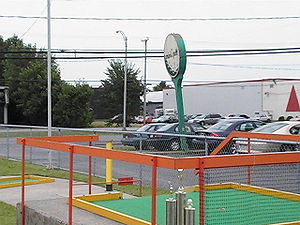
Defi mini-putt
Encyclopedia

Quebec
Quebec or is a province in east-central Canada. It is the only Canadian province with a predominantly French-speaking population and the only one whose sole official language is French at the provincial level....
cable
Cable television
Cable television is a system of providing television programs to consumers via radio frequency signals transmitted to televisions through coaxial cables or digital light pulses through fixed optical fibers located on the subscriber's property, much like the over-the-air method used in traditional...
sports network, Réseau des sports
Réseau des sports
Réseau des sports , is a Canadian French language Category C specialty channel showing sports and sport-related shows. It is available in 2.5 million homes, and is owned by CTV Specialty Television Inc....
(RDS). It was the first professional miniature golf
Miniature golf
Miniature golf, or minigolf, is a miniature version of the sport of golf. While the international sports organization World Minigolf Sport Federation prefers to use the name "minigolf", the general public in different countries has also many other names for the game: miniature golf, mini-golf,...
tournament to be regularly broadcast in Quebec.
Although the format of the show varied over the years, the typical set-up for the 30-minute show was the following: four competitors would play 18 holes of miniature golf on one of the courses of the "Mini-Putt" miniature golf franchise. It was a skins game
Skins Game
A skins game is a type of scoring for various sports, most notably golf but also for curling and bowling.-LG Skins Game:There was an annual skins game for male professional golfers which takes place in November or December each year after the end of the official PGA Tour season. It is recognized by...
. The first 6 holes were worth $50, the second 6 were worth $100, while the final 6 holes were worth $150. At the end of the season was a championship knockout tournament, in which the player with the highest score after each hole was eliminated.
Each course had exactly the same design, and every hole was a par 2. The Mini-Putt franchise used a minimalist design, featuring only hills, bunkers, and a few obstacles. This contrasts with the exotic, windmill-laden layouts of most miniature golf courses in the eastern United States and Canada. The names of the holes were:
- Le totem (three six-inch totem poles)
- La croix (flat course in the shape of a cross)
- La courbe
- La disco
- Le billard
- Le hockey
- La rivière
- Le putter
- Le chameau
- Les trappes
- Le carrefour
- Le slalom
- Les laurentides (three small hills around the hole)
- Le zig-zag
- Le monstre
- La culotte
- L'équerre
- Le plateau (a steep incline)
Some of the stars of the show were Jocelyn Noël, who had great consistency in the regular season but sometimes struggled in the knockout tournaments (most notably in 1992 when he struck a totem pole on the first hole, aka "les totems" and was eliminated), as well as the legendary Carl Carmoni best known for his mastery of the green and his Pepsi addiction, Sylvain Cazes and Gilles Buissières. The biggest star of the show, however, was the inexplicably enthusiastic Serge Vleminckx, the show's announcer. His exuberant shouts of "Birdie!" for a hole in one, "la normale!" for two strokes, and "le bogey!" for three strokes, helped attract a cult following for the show. Another famous "double" couple was Suzanne and husband André Buist.
Later seasons of the show featured teams of two, as well as an upgrade to the Mini-Putt franchise's more difficult course, the "Maxi-Putt". However, by the end of the 1990s, the Mini-Putt chain began to falter, and the show was discontinued. Jocelyn Noel went on to participate in American miniature golf tournaments, while Serge Vleminckx went on to announce games for the short-lived Montreal Roadrunners
Montreal Roadrunners
The Montreal Roadrunners played from 1994 to 1997 in the Roller Hockey International. Their home games were at the Montreal Forum and the Molson Centre...
roller hockey team.
Linguistically, the show prompted "mini-putt" to become the favoured Québécois
French-speaking Quebecer
French-speaking Quebecers are francophone residents of the Canadian province of Quebec....
term for miniature golf, while in the rest of Canada and the United States, the terms "miniature golf", "mini-golf", "crazy golf", and occasionally "putt-putt" are used interchangeably.

